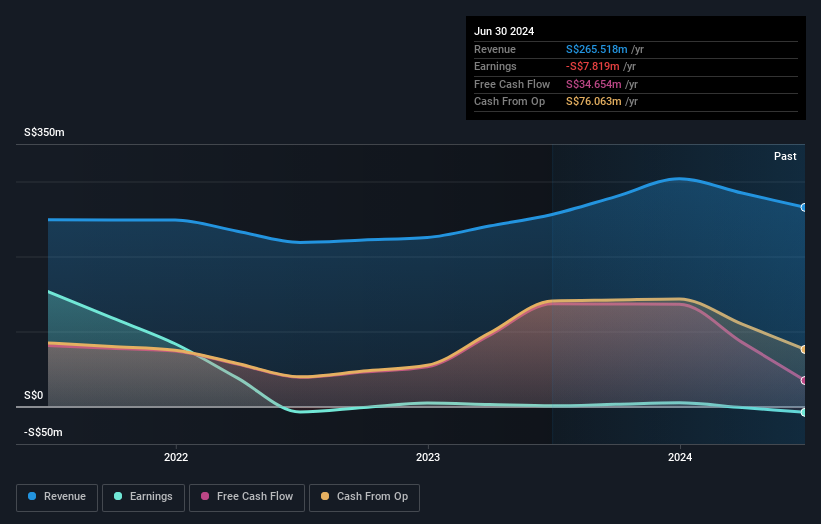- Singapore
- /
- Real Estate
- /
- SGX:T24
Private companies among Tuan Sing Holdings Limited's (SGX:T24) largest shareholders, saw gain in holdings value after stock jumped 13% last week

Key Insights
- The considerable ownership by private companies in Tuan Sing Holdings indicates that they collectively have a greater say in management and business strategy
- Nuri Holdings (S) Pte Ltd. owns 54% of the company
- Ownership research, combined with past performance data can help provide a good understanding of opportunities in a stock
Every investor in Tuan Sing Holdings Limited (SGX:T24) should be aware of the most powerful shareholder groups. We can see that private companies own the lion's share in the company with 54% ownership. Put another way, the group faces the maximum upside potential (or downside risk).
As a result, private companies were the biggest beneficiaries of last week’s 13% gain.
Let's delve deeper into each type of owner of Tuan Sing Holdings, beginning with the chart below.
See our latest analysis for Tuan Sing Holdings

What Does The Institutional Ownership Tell Us About Tuan Sing Holdings?
Many institutions measure their performance against an index that approximates the local market. So they usually pay more attention to companies that are included in major indices.
Less than 5% of Tuan Sing Holdings is held by institutional investors. This suggests that some funds have the company in their sights, but many have not yet bought shares in it. If the company is growing earnings, that may indicate that it is just beginning to catch the attention of these deep-pocketed investors. When multiple institutional investors want to buy shares, we often see a rising share price. The past revenue trajectory (shown below) can be an indication of future growth, but there are no guarantees.

Tuan Sing Holdings is not owned by hedge funds. Nuri Holdings (S) Pte Ltd. is currently the largest shareholder, with 54% of shares outstanding. This essentially means that they have extensive influence, if not outright control, over the future of the corporation. For context, the second largest shareholder holds about 6.1% of the shares outstanding, followed by an ownership of 1.7% by the third-largest shareholder.
Researching institutional ownership is a good way to gauge and filter a stock's expected performance. The same can be achieved by studying analyst sentiments. We're not picking up on any analyst coverage of the stock at the moment, so the company is unlikely to be widely held.
Insider Ownership Of Tuan Sing Holdings
The definition of an insider can differ slightly between different countries, but members of the board of directors always count. Company management run the business, but the CEO will answer to the board, even if he or she is a member of it.
I generally consider insider ownership to be a good thing. However, on some occasions it makes it more difficult for other shareholders to hold the board accountable for decisions.
Shareholders would probably be interested to learn that insiders own shares in Tuan Sing Holdings Limited. It has a market capitalization of just S$336m, and insiders have S$25m worth of shares, in their own names. Some would say this shows alignment of interests between shareholders and the board. But it might be worth checking if those insiders have been selling.
General Public Ownership
The general public, who are usually individual investors, hold a 36% stake in Tuan Sing Holdings. While this group can't necessarily call the shots, it can certainly have a real influence on how the company is run.
Private Company Ownership
It seems that Private Companies own 54%, of the Tuan Sing Holdings stock. Private companies may be related parties. Sometimes insiders have an interest in a public company through a holding in a private company, rather than in their own capacity as an individual. While it's hard to draw any broad stroke conclusions, it is worth noting as an area for further research.
Next Steps:
I find it very interesting to look at who exactly owns a company. But to truly gain insight, we need to consider other information, too. Consider for instance, the ever-present spectre of investment risk. We've identified 2 warning signs with Tuan Sing Holdings , and understanding them should be part of your investment process.
If you would prefer check out another company -- one with potentially superior financials -- then do not miss this free list of interesting companies, backed by strong financial data.
NB: Figures in this article are calculated using data from the last twelve months, which refer to the 12-month period ending on the last date of the month the financial statement is dated. This may not be consistent with full year annual report figures.
Valuation is complex, but we're here to simplify it.
Discover if Tuan Sing Holdings might be undervalued or overvalued with our detailed analysis, featuring fair value estimates, potential risks, dividends, insider trades, and its financial condition.
Access Free AnalysisHave feedback on this article? Concerned about the content? Get in touch with us directly. Alternatively, email editorial-team (at) simplywallst.com.
This article by Simply Wall St is general in nature. We provide commentary based on historical data and analyst forecasts only using an unbiased methodology and our articles are not intended to be financial advice. It does not constitute a recommendation to buy or sell any stock, and does not take account of your objectives, or your financial situation. We aim to bring you long-term focused analysis driven by fundamental data. Note that our analysis may not factor in the latest price-sensitive company announcements or qualitative material. Simply Wall St has no position in any stocks mentioned.
About SGX:T24
Tuan Sing Holdings
An investment holding company, engages in the property development and investment, hotels investment, and industrial services businesses in Singapore, Australia, China, Malaysia, and Indonesia.
Second-rate dividend payer and slightly overvalued.
Similar Companies
Market Insights
Community Narratives




